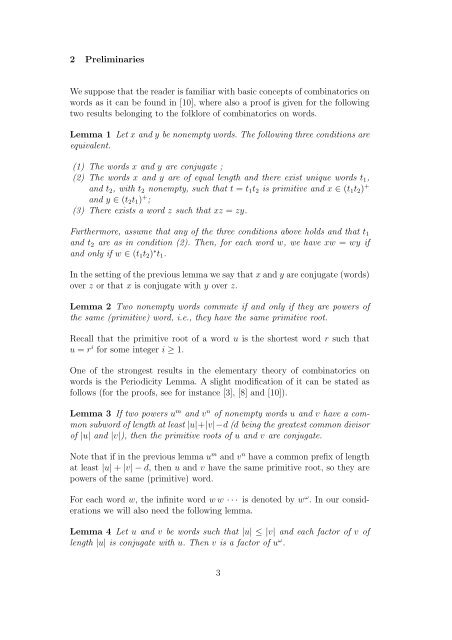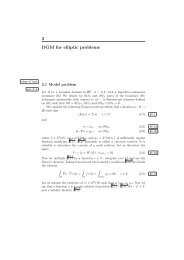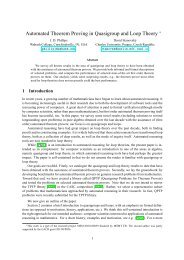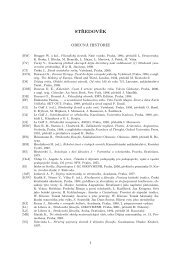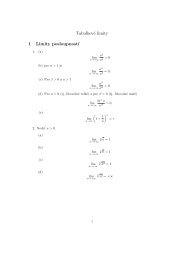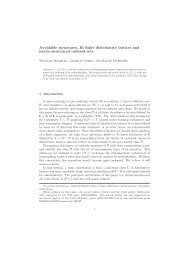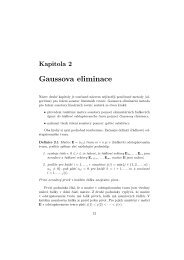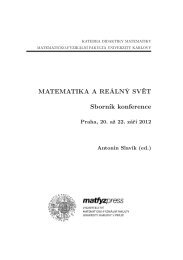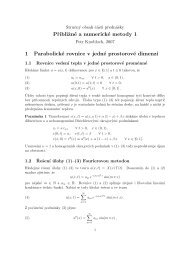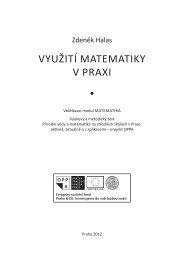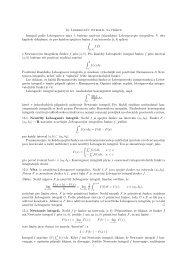On systems of word equations with simple loop sets
On systems of word equations with simple loop sets
On systems of word equations with simple loop sets
Create successful ePaper yourself
Turn your PDF publications into a flip-book with our unique Google optimized e-Paper software.
2 Preliminaries<br />
We suppose that the reader is familiar <strong>with</strong> basic concepts <strong>of</strong> combinatorics on<br />
<strong>word</strong>s as it can be found in [10], where also a pro<strong>of</strong> is given for the following<br />
two results belonging to the folklore <strong>of</strong> combinatorics on <strong>word</strong>s.<br />
Lemma 1 Let x and y be nonempty <strong>word</strong>s. The following three conditions are<br />
equivalent.<br />
(1) The <strong>word</strong>s x and y are conjugate ;<br />
(2) The <strong>word</strong>s x and y are <strong>of</strong> equal length and there exist unique <strong>word</strong>s t 1 ,<br />
and t 2 , <strong>with</strong> t 2 nonempty, such that t = t 1 t 2 is primitive and x ∈ (t 1 t 2 ) +<br />
and y ∈ (t 2 t 1 ) + ;<br />
(3) There exists a <strong>word</strong> z such that xz = zy.<br />
Furthermore, assume that any <strong>of</strong> the three conditions above holds and that t 1<br />
and t 2 are as in condition (2). Then, for each <strong>word</strong> w, we have xw = wy if<br />
and only if w ∈ (t 1 t 2 ) ∗ t 1 .<br />
In the setting <strong>of</strong> the previous lemma we say that x and y are conjugate (<strong>word</strong>s)<br />
over z or that x is conjugate <strong>with</strong> y over z.<br />
Lemma 2 Two nonempty <strong>word</strong>s commute if and only if they are powers <strong>of</strong><br />
the same (primitive) <strong>word</strong>, i.e., they have the same primitive root.<br />
Recall that the primitive root <strong>of</strong> a <strong>word</strong> u is the shortest <strong>word</strong> r such that<br />
u = r i for some integer i ≥ 1.<br />
<strong>On</strong>e <strong>of</strong> the strongest results in the elementary theory <strong>of</strong> combinatorics on<br />
<strong>word</strong>s is the Periodicity Lemma. A slight modification <strong>of</strong> it can be stated as<br />
follows (for the pro<strong>of</strong>s, see for instance [3], [8] and [10]).<br />
Lemma 3 If two powers u m and v n <strong>of</strong> nonempty <strong>word</strong>s u and v have a common<br />
sub<strong>word</strong> <strong>of</strong> length at least |u|+|v|−d (d being the greatest common divisor<br />
<strong>of</strong> |u| and |v|), then the primitive roots <strong>of</strong> u and v are conjugate.<br />
Note that if in the previous lemma u m and v n have a common prefix <strong>of</strong> length<br />
at least |u| + |v| − d, then u and v have the same primitive root, so they are<br />
powers <strong>of</strong> the same (primitive) <strong>word</strong>.<br />
For each <strong>word</strong> w, the infinite <strong>word</strong> w w · · · is denoted by w ω . In our considerations<br />
we will also need the following lemma.<br />
Lemma 4 Let u and v be <strong>word</strong>s such that |u| ≤ |v| and each factor <strong>of</strong> v <strong>of</strong><br />
length |u| is conjugate <strong>with</strong> u. Then v is a factor <strong>of</strong> u ω .<br />
3


